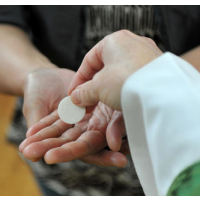Is it Possible to be Gluten-Free and Catholic?
 (photo: Catholic Church in England and Wales)
(photo: Catholic Church in England and Wales)
Accepting the symbolic offering of Jesus Christ’s body no longer has to mean becoming seriously ill for Catholics who have trouble with gluten.
The church is now offering gluten-free communion wafers to worshippers who have Celiac disease, an autoimmune disorder that can produce stomach pain, fatigue and other problems.
The disease has become more common in recent years, and now affects upwards of 1 in 133 people. It has also spawned a multi-billion-dollar industry that produces and sells gluten-free food to all who want it, and which has also led to supermarkets devoting entire sections or aisles to gluten-free product. The gluten-free juggernaut amassed $23 billion in U.S. sales in 2014, doubling its take from only four years ago, according to the Nielsen research firm.
With more and more people choosing to reduce, if not eliminate gluten from their diet, Catholic leaders have tried to accommodate those who can’t ingest communion wafers—which are made of whole wheat per the Code of Canon Law—without getting sick.
“Imagine how painful and spiritually challenging it is for faithful Catholics, who desire to receive Holy Communion weekly or even daily, but who are unable to ingest wheat bread because of the grave physical harm it can cause them,” wrote Monsignor Mark J. Meridian in Homiletic and Pastoral Review.
While “gluten lite” wafers have been an existing option for parishioners in Europe, Catholic officials in the U.S. have just begun adopting the practice, especially because the low-gluten wafers have only recently become available in this country. For instance, the Benedictine Sisters of Perpetual Adoration in Missouri developed a special wafer that conforms with Catholic tradition while subjecting parishioners to only .001% of gluten.
“Our consciousness of this is definitely being raised,” Father Michael Flynn, executive director of the Secretariat of Divine Worship at the U.S. Conference of Catholic Bishops, told Reuters. “The question that’s always kind of a balancing act is how much can you tweak bread and still have it be bread.”
While the Catholic Church continues to juggle the ingredients of bread with faith, some observers have taken casual gluten-free devotees—and the food industry at large—to task for transforming what is a dietary necessity for some into a fad for everyone else.
“How in the world did less than 1 percent of the population with celiac disease, a genetic disorder, kidnap the gastronomic narrative of the remaining 311,000,000 people in the United States concerning gluten, a composite protein found in two of the world’s most important staples, pasta and bread?” asked culinary historian Clifford A. Wright in an editorial for The New York Times.
“It’s not clear just when talking heads and bloggers caught the gluten fever, but once they started buzzing about how avoiding the stuff can help you lose weight, fight infertility, overcome fatigue, treat diabetes and—again and always—reduce the symptoms of autism, there was no going back,” wrote Jeffrey Kluger at TIME.
Indicative of the diet’s trendiness, companies now make gluten-free dog food while Facebook features more than a thousand “gluten-free” groups, including a “gluten-free singles” dating club.
“Fads can run concurrently, but none of them seem to ‘have legs.’ By their very nature they die. This fad too shall pass,” added Wright. “If I were paranoid I’d say any dietary regimen denying pasta and bread (staff of life) because of gluten would be a direct attack on Italian culture because, as Sophia Loren once said of her sex appeal, ‘Everything you see is because of pasta.’”
Meanwhile, the Catholic Church will accommodate its gluten-intolerant members by incorporating gluten-free wafers into its proceedings. No “gluten-free masses” have yet been reported, but a trend could be in the making.
- Danny Biederman, Noel Brinkerhoff
To Learn More:
Low-Gluten Diet Alternatives Have Reached A New Frontier: The Catholic Church (by Sam P.K. Collins, Think Progress)
U.S. Churches Catching on to Communion Breads Free of Gluten (by Colleen Jenkins, Reuters)
Celiac Disease and Holy Communion: A Medical and Spiritual Dilemma (by Mark Merdian, Homiletic and Pastoral Review)
- Top Stories
- Unusual News
- Where is the Money Going?
- Controversies
- U.S. and the World
- Appointments and Resignations
- Latest News
- Trump Orders ICE and Border Patrol to Kill More Protestors
- Trump Renames National Football League National Trump League
- Trump to Stop Deportations If…
- Trump Denounces World Series
- What If China Invaded the United States?






Comments